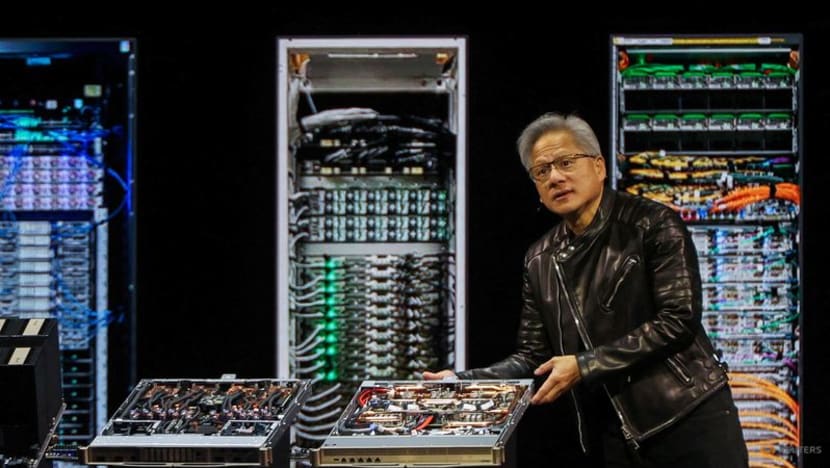World
China Leverages Nvidia’s AI Chips While Boosting Huawei’s Position

In a significant development, China’s response to the recent policy shift by the United States, which allows the sale of Nvidia’s H20 artificial intelligence chips back on its mainland, has raised eyebrows. This reaction appears to be a strategic move by Chinese authorities to buy time for domestic tech giant Huawei while maintaining pressure on U.S. trade negotiations.
Chinese officials have displayed a cautious attitude towards Nvidia’s technology, despite the fact that the country’s AI ambitions heavily depend on the hardware produced by the company. Following the announcement from the Trump administration, which lifted export controls on H20 chips, Nvidia’s CEO, Jensen Huang, received a warm welcome from industry leaders in Beijing. This initial enthusiasm suggested that China had achieved a desirable outcome in the ongoing trade discussions.
However, in the weeks that followed, the narrative shifted. Cyber authorities summoned Nvidia to discuss potential security risks linked to the H20 chips. State media issued warnings about supposed backdoors in the technology, which could lead to dire consequences. Furthermore, the government encouraged local companies to reconsider their use of these highly sought-after processors for AI development.
U.S. Treasury Secretary Scott Bessent commented on the situation, indicating that China’s reaction revealed concerns about Nvidia chips becoming the standard in the Chinese market. However, this perspective may oversimplify a complex situation.
Chinese companies, including major players like Bytedance and Alibaba, have demonstrated substantial demand for Nvidia’s technology, having placed billions of dollars in orders prior to the ban being reversed. The absence of an outright ban from Beijing suggests that, despite the rhetoric, the appetite for H20 chips remains strong among Chinese firms eager to advance their AI projects.
The stance taken by the Communist Party, which included highlighting the alleged security threats posed by Nvidia’s chips, did not seem to deter the market. The People’s Daily published an editorial warning of backdoors, but analysis from the China Media Project indicated that this was not an official denunciation but rather an attempt to pressure Nvidia.
Despite the emphasis on national security, it appears that regulators are reluctant to impede the progress of companies like DeepSeek. The AI firm recently faced challenges in utilizing Huawei hardware for its new model, forcing it to collaborate with Nvidia for training while using Huawei for inference tasks. This indicates that while there is a preference for domestic alternatives, the current performance and availability of Huawei’s technology are not sufficient to meet immediate needs.
In a notable twist, the Trump administration announced that Nvidia would pay a 15 percent revenue fee on its AI chip sales in China. Such a transactional approach raises questions about the implications for international trade standards. Beijing is likely aware of the complexities of this deal, especially as tariff negotiations continue.
China’s posture may be a temporary façade as it works towards strengthening its domestic AI capabilities. Companies like iFlytek have reported advancements using Huawei processors, suggesting that progress is being made. However, the prevailing preference for Nvidia’s technology underscores the challenges that remain.
As the Chinese tech landscape evolves, the balance between reliance on foreign technology and fostering domestic innovation will be crucial. The eventual shift towards Huawei’s offerings could redefine the competitive landscape, but until then, Nvidia’s foothold remains significant. For Washington, the low price of the revenue cut could facilitate a smoother transition in this intricate geopolitical context.
-

 Business5 months ago
Business5 months agoKenvue Dismisses CEO Thibaut Mongon as Strategic Review Advances
-

 Lifestyle4 months ago
Lifestyle4 months agoHumanism Camp Engages 250 Youths in Summer Fest 2025
-

 Sports4 months ago
Sports4 months agoDe Minaur Triumphs at Washington Open After Thrilling Comeback
-

 Sports5 months ago
Sports5 months agoTupou and Daugunu Join First Nations Squad for Lions Clash
-

 Top Stories5 months ago
Top Stories5 months agoColombian Senator Miguel Uribe Shows Signs of Recovery After Attack
-

 World5 months ago
World5 months agoASEAN Gears Up for Historic Joint Meeting of Foreign and Economic Ministers
-

 Health4 months ago
Health4 months agoNew Study Challenges Assumptions About Aging and Inflammation
-

 Business5 months ago
Business5 months agoOil Prices Surge Following New EU Sanctions on Russia
-

 Entertainment4 months ago
Entertainment4 months agoDetaşe-Sabah Violin Ensemble Captivates at Gabala Music Festival
-

 Entertainment4 months ago
Entertainment4 months agoBaku Metro Extends Hours for Justin Timberlake Concert
-

 Top Stories5 months ago
Top Stories5 months agoRethinking Singapore’s F&B Regulations Amid Business Closures
-

 Business5 months ago
Business5 months agoU.S. House Approves Stablecoin Bill, Sends to Trump for Signature









